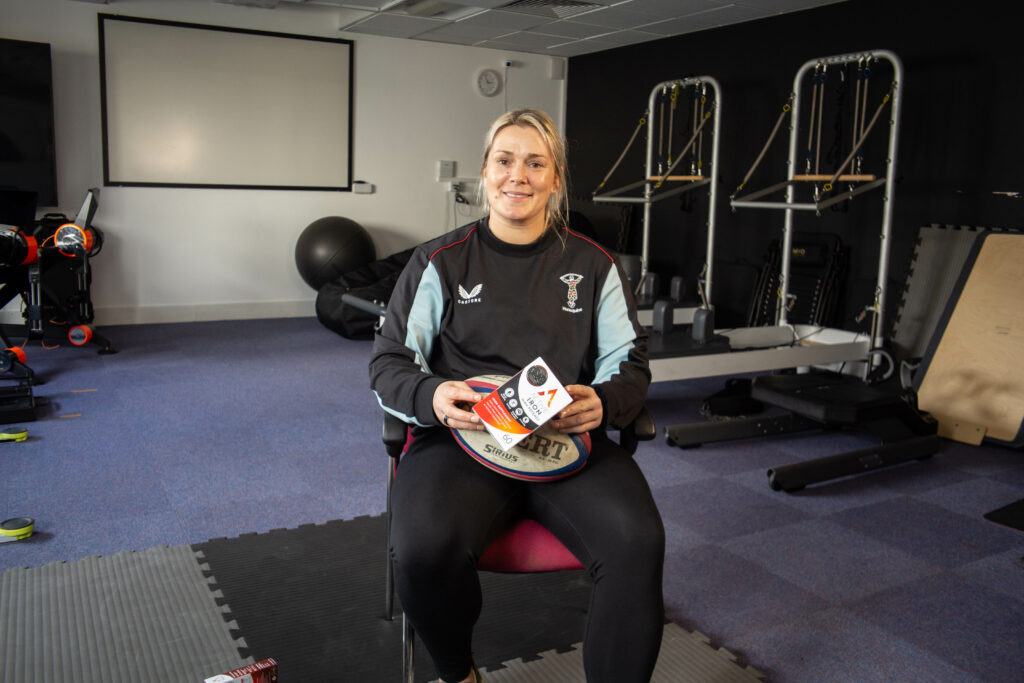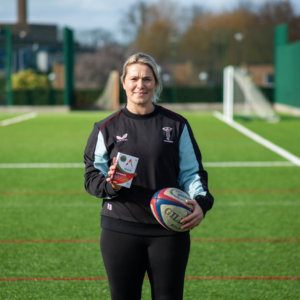‘We’ve broken the big red taboo in rugby, but more can still be done to understand the link between periods, performance and injury risks so we harness menstrual cycles to support athletic success’, says former Red Roses and Harlequins rugby star Rachael Burford.
For many women, the arrival of their periods can evoke feelings of dread. Harlequins star Rachael Burford once shared this sentiment but now advocates for change. She says that with awareness, menstruation needn’t hinder performance, and can truly empower women in sport.
Burford knows the challenge of being a professional sports woman on her period better than most. Having enjoyed a glittering 13-year international career at the pinnacle of women’s rugby, including representing England at not one, but four World Cups – claiming the coveted title in 2014 – she’s performed consistently on the world stage.
“Early on in my career the way to deal with it, for me at least, was to ignore it and almost pretend it did not exist, which I know now is not the right way,” she says.
“I remember distinctly, we were going into the World Cup, and I started my period and I just didn’t want to deal with it, so I decided to take the contraceptive pill as a method to just put it aside, as opposed to actually understanding my menstrual cycle in greater detail.
“Looking back, I realise I should have taken the time to understand the negative impacts my cycle could have had, and put things in place to minimise them,” Burford added. “Back then, there wasn’t any discussion. We didn’t talk about our periods, we didn’t talk about the symptoms, we didn’t talk about how training or performance might look like when you were feeling that way.”
Tracking periods
Burford, who recently announced her retirement from the professional game, says it took some time for her to get a handle on her period, but found the key to managing it was gaining an understanding of her entire menstrual cycle and what’s happening during each phase.
“For many women that think about managing their period, they tend to focus on the actual three to five day cycle when they are bleeding, even though the menstrual cycle lasts 28 days,” she says.
Burford believes that many women simply don’t have the knowledge to understand the impact that each phase of the menstrual cycle can have on everything from their energy levels, to recovery, pain or even their mood, so focus almost exclusively on the menstruation phase.
“Something that I found really useful was tracking my menstrual cycle. I was able to use an app that breaks it down in phases, including the physiological effects that I’m likely to be feeling and what I might need to do to find solutions.
“There are certain phases in your menstrual cycle where you should be going after personal bests (PBs), and you should be pushing yourself in the fitness area. We should actually be harnessing how we can use it as a positive, not just seeing it as something that just arrives every month and causes problems. It’s so important to shift that mentality.
“With the right knowledge, women can understand and harness the incredible things happening in their bodies, turning them into a superpower!”
Monitoring menstrual cycles in elite sports is a relatively new practice, but it is increasingly associated with on-field success.
England’s Lionesses utilised it to manage the challenges of menstrual cycles during their triumphant European Championship campaign in 2022, while period tracking apps are employed by thousands of professional female athletes worldwide, including LPGA Tour players, WNBA athletes, and professional footballers.
“Through tracking I’m now not only able to understand my menstrual cycle, but also how to combat the symptoms of it. Whether that’s through nutrition by taking on more antioxidants, carbohydrates or iron, tailoring my training, or doing more prehab and stability work due to my increased susceptibility to injury.”

Managing symptoms
Her curiosity and passion for supporting women with their menstrual cycles in sport led her to leading iron supplement specialist, Active Iron. Burford is now part of a campaign by the brand to highlight the importance of optimised iron levels for female athletes, given that iron loss is a prevalent side effect of menstrual bleeding.
“One of the most incredible things I learned, particularly when I started to work with Active Iron, is understanding that you’re actually losing a lot of blood during your period,” said Burford. “People often forget that the blood we lose is not just extra blood we produce during the menstrual cycle; it’s actually blood from our body’s existing stores. This means that your blood count and your red cell count is going to be down, which then leads to fatigue and tiredness.”
Low iron levels are common in athletes. It has been reported to impact 15-35% of female athletes*. Naturally, female athletes are at further risk of low iron due to monthly menstrual losses**.
While it varies from female to female, most women will lose 20-90 ml of blood during their period. Those who have heavy periods, can have losses in excess of 160ml during their monthly cycle. Studies have shown that 1 in 3 women suffer from heavy menstrual bleeding.
“If you’re going to tackle your menstrual cycle, it’s all about making small changes, not big adjustments that are not management or sustainable,” says Burford, who described awareness and education as two of the most important factors when dealing with symptoms.
“For me this could be adaptation around nutrition, rest and recovery, or adding daily supplementation for things like iron to my training schedule to help manage low energy levels and fatigue.
“For high-performance athletes, training is weekly, and competitions happen every weekend, and these aren’t going anywhere, and nor are your periods. That’s why it’s so important to find solutions. By tracking your cycle and symptoms, you can spot persistent issues and actually deal with them, instead of just pushing through.”
*Sims. S. et al; High Prevalence of Iron Deficiency Exhibited in Internationally Competitive, Non-Professional Female Endurance Athletes—A Case Study Int J Environ Res Public Health; 2022, **Heavy periods. WOMEN’S HEALTH CONCERN FACT SHEET; 2022. www.womens-health-concern.org

Rachael Burford
Athlete & Rugby Player
Rachael Burford is an accomplished international rugby player with a remarkable career representing England. Born on August 19, 1986, in Kent, England, she has earned over 80 caps since her debut in 2006. Burford has been a pivotal member of the England women’s rugby team, contributing significantly to their numerous successes including playing a crucial role in England’s triumphant 2014 Women’s Rugby World Cup victory.
Renowned for her versatility as a centre, Burford’s tactical acumen, powerful runs, and solid defence have made her a standout player on the domestic stage. She is currently club captain of Harlequins and has also enjoyed considerable success at Medway RFC and Richmond FC, one of England’s most successful women’s rugby clubs.
Off the field, Burford is a dedicated advocate for women’s sports and the co-founder of the Girls Rugby Club, which works with girls of all ages to develop confidence both on and off the pitch through rugby. Her contributions to the sport have made her an influential figure in rugby, both nationally and internationally.


